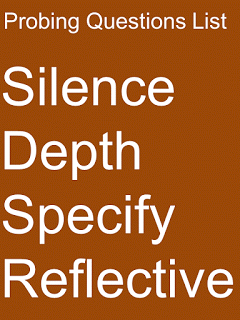Example: “Can you explain why the pump’s temperature is important?”

Probing Questions Examples List
From this the agent will understand why and in what context temperature is important.
Six types of probing questions:
Silence probe: in the case of an inadequate response, retaining eye contact and remaining silent will encourage further response.Prompting probe: if nonverbal probe does not stimulate further response, use verbal techniques such as, “Please continue…” “yes?”
Last chance probe: ensuring all necessary information has been elicited, such probes are instigated by such phrases as, “Is there anything more we should know…?”
Depth probe: triggered by such phrases as, “Explain Further…” or “Tell us more about…”, there probes encourage the expert to provide more in-depth information.
Reflective Probe: if the call center agent suspects that a question has been answered incorrectly, the answer is repeated with emphasis on the part that is in question.
To get specific answer, probing questions are used. Probing questions can be replaced with open ended questions when you expect more elaborative or descriptive answers from others. Examples of probing questions include:
Can you tell me more about this topic, please?
Are there any other ideas that could support your idea?
Sales trainers admire probing questions and consciously include them in almost all sales training sessions.
For both inbound and outbound call center agents who deal with sales and customer service, probing questions can help elicit more information from the prospect/customer.
